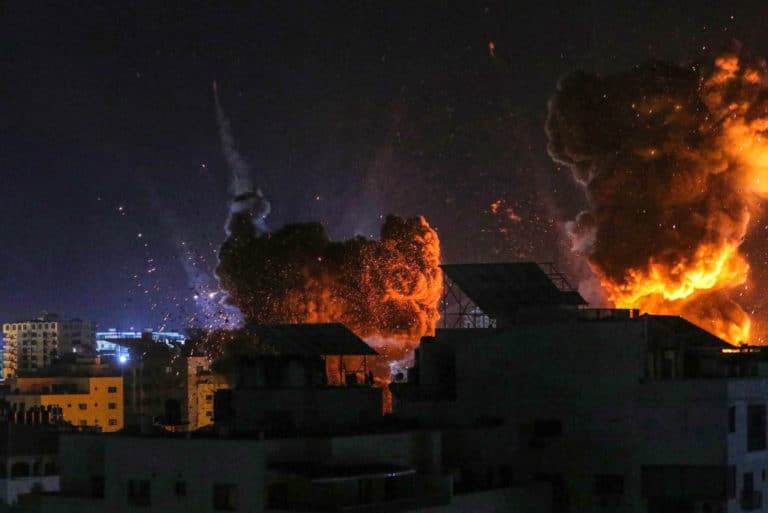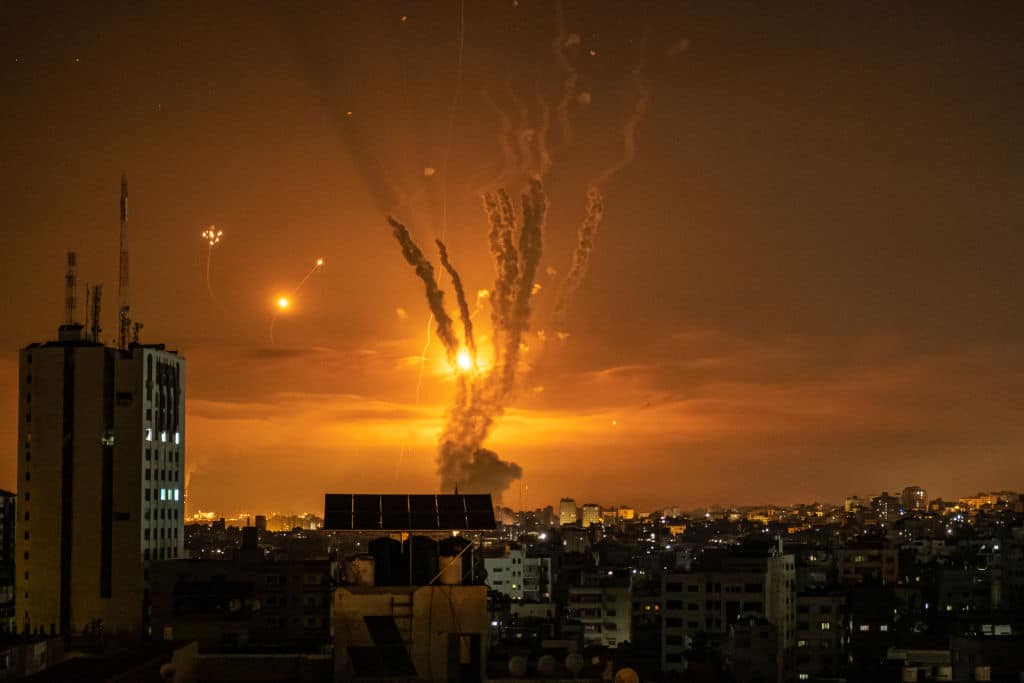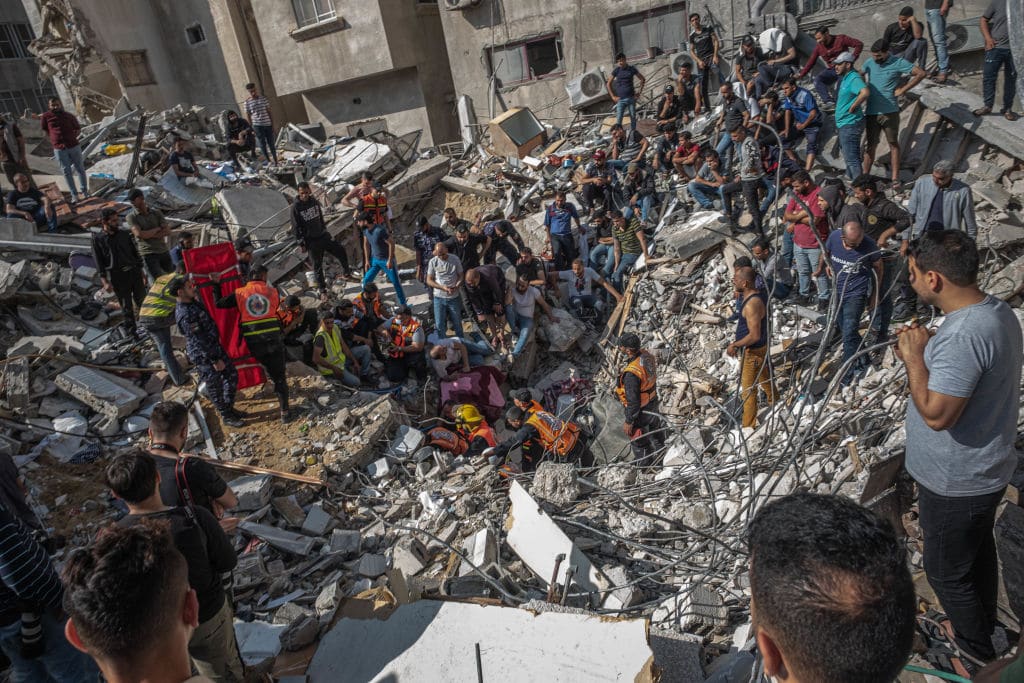
A ceasefire is now in place between Israel and Hamas in the Gaza Strip bringing an end to 11 days of fighting. So what happened?
First, in case you need a refresher, here’s how this conflict started.
Fatalities

In Israel 12 people were killed, including a 5-year-old boy, a 16-year-old-girl and a soldier. At least 300 have been wounded and an additional 200 were injured in riots between Jews and Arabs. At least 20 people were killed in the West Bank in clashes with Israeli security forces.
The Gaza Health Ministry, which is controlled by Hamas, reports that at least 230 have been killed, and among the killed are reportedly 65 children and 39 women. The death toll has not been independently verified and, according to the Associated Press, “the Gaza Health Ministry does not break the numbers down into fighters and civilians.”
Hamas and the terrorist group Islamic Jihad claim that only 20 of their fighters have been killed, The IDF estimates that number is at least 130.
Fighting
Israel’s Iron Dome continues to intercept rockets during the latest attack. pic.twitter.com/UgI12eQnDP
— The Post Millennial (@TPostMillennial) May 15, 2021
Israel says Hamas and other fighters fired more than 4,000 rockets towards Israel, most were intercepted by the Iron Dome.
Of those 4,000 rockets fired, the Associated Press reports hundreds misfired and fell back into Gaza (it is unknown how many people were injured or killed in the misfirings).
Israel says it conducted hundreds of airstrikes in Gaza targeting Hamas military infrastructure above and below ground.
Damage
🚨 Close call. This is not a laughing matter. Hear the siren take cover. This could have ended way worse. 🚨 pic.twitter.com/NF9WwplObS
— Johnny “Facts Matter” Kunza (@johnkunza) May 11, 2021
In Israel, Hamas-fired rockets hit an oil pipeline, landed in multiple residential areas, parks and at least 3 schools were hit. Several synagogues were damaged in civil unrest that followed the rocket firings.
In the Gaza Strip, NGO Save the Children says 50 schools were damaged. According to reports, 17 hospitals or clinics were also damaged.
The IDF says Hamas uses civilian buildings for military purposes and that they try to do their best to mitigate civilian casualties, for example news agency Reuters documented the IDF calling a building manager asking him to evacuate the property.
Also, from the NY Times:
A spokesman for the Israeli Army, Lt. Col. Jonathan Conricus, did not deny Israel’s airstrikes had caused damage to civilian infrastructure, but he said Israeli military leaders did their best to avoid it.
“Obviously, yes, health care facilities, mosques, schools, water facilities and the like are all marked in our system as sensitive infrastructure that must not be targeted and affected by our fire,” he said. “Obviously we take precautions.”
Look closely: This photo was taken right after Hamas launched a barrage of rockets at Israel from a residential area in Gaza. Look what's near the launch site: schools, a UN building, a health center, mosques, and dozens of apartment buildings.
— Israel Defense Forces (@IDF) May 19, 2021
Hamas puts everyone in danger. pic.twitter.com/dVPpUUJVy3
Also targeted was a tower housing several news outlets including the Associated Press and Al Jazeera. Israel says it shared “smoking gun” intelligence with the United States that showed the building was being used by Hamas. The AP disputes this.
Jewish-Arab riots in Israel
Violent clashes break out in mixed Arab-Jewish communities in #Israel.
— i24NEWS English (@i24NEWS_EN) May 13, 2021
Pierre Kochendler reports from #Lod: pic.twitter.com/YGhFK1sxMa
The last 11 days also saw outbreaks of Jewish-Arab riots in Israel. A state of emergency was declared in Lod, southeast of Tel Aviv, due to the situation there.
From the Jerusalem Post:
The extended order comes as Lod, Ramla and other cities with mixed populations of Israeli Jews and Arabs experience violent rioting and infighting on an almost nightly basis. The unrest has left one dead, scores injured, and homes, vehicles and businesses torched.
Violence also reached far north, in Acre as well.
Heartbreaking. Theatre in Acre, Israel, a symbol of Arab – Jewish coexistence for over 35 years, torched & vandalized by Arab rioters.
— Joyce Karam (@Joyce_Karam) May 14, 2021
Encapsulates the deep damage and community fissures of this week, that will take long to heal: pic.twitter.com/KHQsMolUuP
Israel: Arab residents of the city of Lod have now opened fire on their Jewish neighbors pic.twitter.com/MOL2jQYymw
— Amichai Stein (@AmichaiStein1) May 13, 2021
Order is returning to the areas, but it is unclear what long term damage has been done between the two communities, but there have also been joint Jewish and Arab rallies across the country expressing solidarity and coexistence.
Humanitarian Crisis

There is a growing humanitarian crisis in the Gaza Strip where the situation was already bad due to a blockade of the territory by both Israel and Egypt. Both countries limit goods into the strip, saying that Hamas uses brought in materials for terrorism purposes.
From the NY Times:
But the Hamas attacks also seem to be contributing to the humanitarian crisis within Gaza.
On Tuesday, as a convoy of 24 trucks carrying much-needed international aid from Israel tried to enter Gaza they came under mortar fire from Palestinian militants, according to Israeli and United Nations officials. Only five of the trucks got through the crossing before the rest were turned back.
The trucks contained medical equipment, animal feed and fuel tanks for the use of international organizations in Gaza, Israeli officials said.
President Joe Biden in a statement on the ceasefire pledged humanitarian support for the Gaza Strip, saying that they will only work with the Palestinian Authority, not Hamas.
Rise in antisemitism
1/ No it's not just you, Jew hatred has dramatically increased. I know I'm not the only one who feels gaslighted at times and confused why more people aren't talking about it. In the past 10 days Jews in the diaspora have been beaten, purged, chased… https://t.co/WdpyYJBpyI
— Johnny “Facts Matter” Kunza (@johnkunza) May 20, 2021
The Jewish diaspora faced a dramatic increase in antisemitism since the start of the conflict. In the United Kingdom alone antisemitic incidents were up 600%. In Los Angeles, two Jews were beaten outside of a restaurant after a mob asked if they were Jewish.
Related: How to talk about the Israeli-Palestinian conflict with your friends
What is each side saying?
Israel says it has dramatically decreased Hamas’ ability to fire rockets and attack Israel. In a statement released after the announcement of the cease fire, Defense Minister Benny Gantz praised Israel’s “unprecedented military achievements in terms of forcefulness, precision and strategic importance in the fight against terror groups in the Gaza Strip.”
Meanwhile, Hamas is positioning itself as the “defender of Jerusalem,” saying that it fired the rockets into Israel as a warning after Israeli security forces entered the Al Aqsa Mosque compound.
Senior Hamas official Osama Hamdan told a Lebanese news channel that Hamas received assurances from Israel on the evictions in Sheikh Jarrah and the Al Aqsa Mosque compound.
“The resistance has forged a new equation and a new victory,” he said.
Israel denies the claims with Gantz saying that they were “completely false.”
Tune in as I deliver remarks on the Middle East. https://t.co/QPiJ6BxS7h
— President Biden (@POTUS) May 20, 2021
President Joe Biden commenting on the ceasefire said that “the United States fully supports Israel’s right to defend itself against indiscriminate rocket attacks from Hamas and other Gaza based terrorist groups that have taken the lives of innocent civilians in Israel.”
“I believe the Palestinians and Israelis equally deserve to live safely and securely and to enjoy equal measures of freedom, prosperity and democracy,” the president said.
Commenting on the casualties, Biden added: “these hostilities have resulted in the tragic deaths of so many civilians, including children and I send my sincere condolences to all the families Israeli and Palestinian who have lost loved ones and I hope for a full recovery of the wounded.”
The president also added that the U.S. would help replenish Israel’s Iron Dome.
Originally Published May 20, 2021 06:38PM EDT
